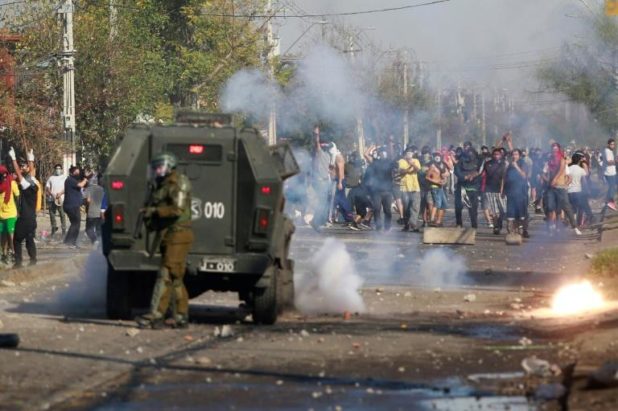In the old country, a few hundred Spaniards have taken to the streets, compliantly donning their depersonalization-conditioning facemasks to bang pots and pans and politely ask if they may please just have a little bit of freedom.
I imagine that the government will politely respond, “No.”
Vox, the “far-right” gatekeeping party of Spain, has asked people to protest in their vehicles to respect social distancing. They have not yet told people to wear clown makeup, but they expect them to honk.
Elsewhere, across the world, their half-blooded descendants are not happy about being pushed back over the poverty line en masse, and are just about ready to burn everything to the ground – which they were always on the verge of doing for no reason at all.
Now, they have a reason.
Chile risks the return of the social unrest that wracked the nation late last year following protests against food shortages in the capital Santiago amid a tight lockdown aimed at slowing the spread of the coronavirus.
Dozens of protesters blocked traffic and threw rocks at police in the poor neighborhood of El Bosque in demonstrations that lasted most of Monday, according to videos posted on social media. Local media reported sporadic incidents in other parts of the city that were capped by pot-banging protests at night in several neighborhoods.
Santiago, one of Latin America’s most prosperous cities, went into a strict lockdown on Friday following a surge in coronavirus cases, though many individual neighboorhoods, including El Bosque had been in quarantine for weeks.
…
Pinera’s administration is implementing stimulus measures equivalent to 7% of gross domestic product as the pandemic sends Chile into its worst recession since the early 1980s. Policy makers pledged to boost unemployment insurance and healthcare spending in the weeks before the latest measures were announced on Sunday night.
Strong interest in the food baskets prompted Pinera to follow up with another speech on Monday promising that distribution would begin as soon as this week. Local radio station Bio Bio reported that some municipalities such as Santiago’s Renca district have been inundated with requests about the food program.
Supply Chains
Complicating matters further are signs of accelerating price increases of food and beverages both in Chile and elsewhere in Latin America. Regionally, lockdowns have strained food supply chains while prompting some panic-buying.
…
Pinera’s administration is grappling with the virus following a period of social upheaval against inequality and poor government services that started last October. Pinera initially called in troops to quell last year’s unrest before agreeing to measures including a plebiscite on a new constitution.
It is my understanding that every year on September 11, these people engage in night protests with tear gas, water cannons, thrown rocks and burning barricades to commemorate the 1973 coup of the Soviet-aligned socialist president, Salvador Allende, and his replacement with the American-aligned capitalist, General Pinochet.
According to Wikipedia, on October 7 of last year, Chilean high school students organized a turnstyle-jumping campaign to protest a small rate hike.
By October 27, the president asked his entire cabinet to resign after the country had been paralyzed with wide-scale protests and riots, a general curfew, the mobilization of the military, the deaths of several protestors from shootings and beatings, and enormous real and financial costs from vandalism, looting, violence and general closures.
And all of this started with a protest of subway fares.
Now, these people are experiencing the same economic collapse as the rest of us, except that they did not have much of an economy to begin with and their government is not as capable of general welfare.
Just as these new deindustrialization policies will stunt the growth of the European Union and challenge its integrity much more deeply than the migrant crisis, a potentially cascading breakdown in order in the Cold War-era American vassal states of South America would be one of several emerging signs that system which they represent has reached its limits, and will now begin to globally recede.
 Daily Stormer The Most Censored Publication in History
Daily Stormer The Most Censored Publication in History




